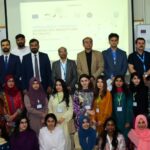Youth’s mental health directly impacts economic growth
Speakers of a two-day international virtual conference stressed in-depth research on youth’s mental health saying that the mental health of the young population has a direct impact on the productivity and economic growth of a country.
Organised by the National Institute of Psychology (NIP), Centre of Excellence, Quaid-i-Azam University, the 8th International Conference titled ‘Mental Health and Productivity: The Challenges for Youth’ provided an opportunity for social scientists, academicians, civil society organizations, and students from all over the world to share their empirical and theoretical work to highlight issues and challenges that the youth is facing and need immediate attention.
In her opening remarks, the conference organizer, Dr. Nelofer Kiran Rauf welcomed the guests and conference delegates and shared that the event will provide a much-needed platform to engage scholars, professionals, academicians, and students not only in oral and poster presentations. NIP Director, Prof. Dr. Rubina Hanif, shared that the conference’s primary focus is on contemporary issues, trends, and challenges faced by the youth that affect various aspects of their lives. She also hoped that the mutual participation and high-quality deliberations of the conference will create an inspiring learning environment, resulting in innovative ideas.
Speaking on the occasion, Dr. Muhammad Idrees, Dean Faculty of Social Sciences, Quaid-i-Azam University highlighted that Pakistan is facing a youth bulge and it is predicted to increase with the current rate of increase in population growth. This is not only causing frustration but also impacting youth’s mental health which is drastically leaving its impact on productivity and economic growth of the country, causing lower mental health and higher indices of illnesses in the youth. He acknowledged NIP for its commitment and drive in organizing this conference on a much-needed theme and urged the conference organizers and participants to take an in-depth insight at the issues and obstacles raised by the covid-19 pandemic among the Pakistani youth, as well as the opportunities created by the transforming patterns of their lives.
Prof. Dr. Muhammad Ali, Vice Chancellor, Quaid-i-Azam University Islamabad said the conference theme was pertinent, considering the problems that the general population of Pakistan is facing. He further stated that keeping in view the critical and challenging issues, it was high time that we focus on a national response in dealing with the crisis of mental health and the challenges it poses for growing individuals.
The inaugural session of the conference was followed by national and international speakers’ online keynote lectures and scientific sessions including 94 oral presentations and 167 poster presentations. All the presentations revolved around themes of the conference including youth mental and physical health; youth and covid-19; youth and community; online gaming and internet addiction; youth and gender issues; digital technology and youth mental health; social media and youth mental health; cyberbullying and victimization; and youth substance abuse/addiction. Well-known researchers from England, the Netherlands, the USA, Canada, and India were also a part of the event and delivered their insightful keynote lectures.
 PM’s Laptop Scheme’s Provisional List has been shared with Department Focal Person. Check your status, please
PM’s Laptop Scheme’s Provisional List has been shared with Department Focal Person. Check your status, please







